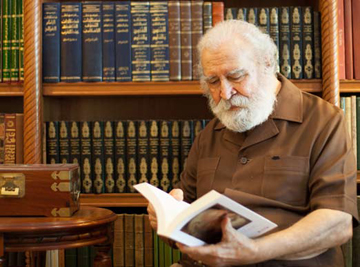Professor S. M. Naquib al-Attas

In 1987, Tan Sri Syed Naquib founded and directed the International Institute of Islamic Thought and Civilization (ISTAC), a world-class post-graduate institution where he taught and collected, over a ten-year period, the unique multilingual library comprising more than one hundred and forty thousand volumes including rare books and manuscripts.The ISTAC library represents a collection of the very best ideas, selected and adapted from fine examples collected from all over the world. It demonstrates an infrastructure produced by serious thought and strong commitment resulting in the establishment of a dynamic, world-class educational institution.Since 1974, Marquis Who’s Who in the World has listed Tan Sri Syed Naquib among individuals who have demonstrated outstanding achievements in their own field of endeavor. As an internationally recognised scholar, he has delivered more than 400 lectures throughout Europe, the United States, Japan, the Far East and the Muslim world. Tan Sri Syed Naquib has written 30 books and many articles on Islam in the fields of Islamic philosophy, theology and metaphysics, history, literature, art and civilisation, religion and education. Some of his works written in English and Malay have been translated into Arabic, Persian, Turkish, Urdu, Punjabi, French, German, Italian, Russian, Bosnian, Albanian, Chinese, Japanese, Korean, Hindi, Malayalam and Indonesian. He is the only scholar in Malaysia who has been awarded the honor of occupying academic chairs in various disciplines.

Tan Sri Syed Naquib’s work has received international recognition and he is at present listed as the 500 most influential Muslims in the world by The Royal Islamic Strategic Studies Centre report (2010). In 1975, he was conferred Fellow of the Imperial Iranian Academy of Philosophy for outstanding contribution in the field of comparative philosophy. From 1976-77, he was a Visiting Professor of Islam at Temple University, Philadelphia, United States. In 1979 the President of Pakistan, General Muhammad Zia ul-Haq, conferred upon him the Iqbal Centenary Commemorative Medal. He was also the first holder of the Tun Abdul Razak Chair of Southeast Asian Studies at Ohio University, U.S.A. (1980–82).For his creative and scholarly contributions to the contemporary Muslim world, Tan Sri Syed Naquib has been internationally honoured including as a Member of the Royal Academy of Jordan (1994). The University of Khartoum conferred upon him the Degree of Honorary Doctorate of Arts (D. Litt.) in June 1995. The Organization of Islamic Conference (OIC), through its subsidiary, the Research Centre for Islamic History, Art and Culture (IRCICA) conferred upon him the IRCICA Award for excellent contributions in the various fields of Islamic civilization (2000); The Russian Academy of Sciences honoured him in a Special Presentation to the Academicians, Moscow (2001); The Iranian Government, through its Society for the Appreciation of Cultural Works and Dignitaries, conferred upon him a special Award of Recognition (2002).

Also in 2002 The Cranlana Programme in Australia has listed him among its scholars (a list which includes Jean-Paul Sartre, Amartya Sen and Martin Luther-King) having powerful ideas and perspectives on the good society, acknowledging him as the first scholar in contemporary times to formulate a comprehensive concept of the Islamic university. The Cranlana Programme acknowledges powerful ideas from the classical period, the Renaissance, the nineteenth century and up to contemporary times.Tan Sri Syed Naquib has also made significant contribution to the history and origin of the modern Malay language. He discovered and published his research on the oldest Malay manuscript, and solved the riddle of the correct arrangement of the Malay-Islamic cyclical calendar. He is the first scholar to discover and establish the correct date of the Trengganu Inscription. His works are referred to by scholars today, especially regarding Malay language studies, and Islamic studies, throughout the world. He is well recognised by Malay historians due to his contribution in formulating the general theory of Islamisation in the Malay-Indonesia Archipelago.


